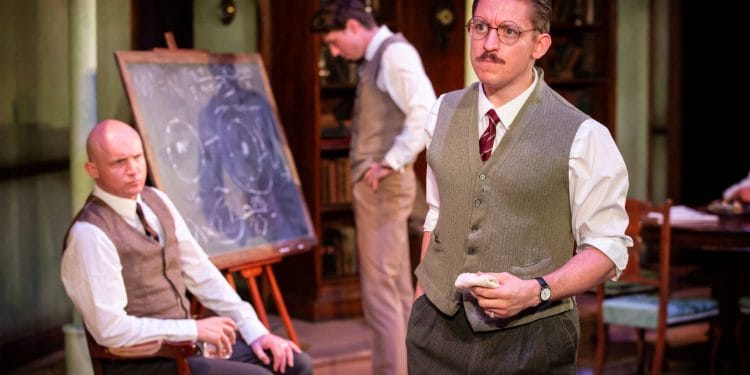 History is written by the victors. That’s what we’ve come to believe over the years, but is it true? In Alan Brody’s Operation Epsilon, that’s just one of the questions that comes up – and that the audience has to contend with.
History is written by the victors. That’s what we’ve come to believe over the years, but is it true? In Alan Brody’s Operation Epsilon, that’s just one of the questions that comes up – and that the audience has to contend with.
In the closing stages of World War II, the Allied forces detained ten highly accomplished German scientists who were held in confinement at Farm Hall, an English country house located just outside Cambridge. Notably, among this group were three distinguished Nobel Prize laureates: Werner Heisenberg, Otto Hahn, and Max von Laue. Their captivity lasted for six months, during which a clandestine operation (the titular Operation Epsilon) recorded their conversations, transcribed them, and transmitted the transcripts to the United States.
The primary objectives behind this operation were twofold. Firstly, Allied leaders sought to assess the extent of progress made by these German scientists in the development of an atomic bomb. Secondly, there was a concern about ensuring that these scientists did not fall into the hands of the Soviet Union.
And so the stage is set for a play based on those real-life transcripts. Yet it’s more than just nuclear science and war-time fury; here we get to see the real men, their worries, their fears, their hopes and wishes for the future. We see that they’re confused, scared, and they miss their family. They’re humans, in other words.
This is a play that asks big questions, and it doesn’t have the answers – which is the point. The biggest question asked in Operation Epsilon is whether or not to believe the group when they say they never intended to build an atomic bomb; they just wanted to create an efficient engine. Even the men themselves don’t seem to want to agree on that prickly topic, and it’s something the audience will have to think about for themselves.
The set design for Operation Epsilon is by Janie E. Howland, and she essentially creates an entire house on stage, complete with bedrooms, studies, and a large living room where most of the action takes place. It’s a gorgeously rendered design, and it feels as though you could step onto the stage, unpack, and move in, bringing the story to life in a tangible way.
Operation Epsilon could be a very static play – it’s a lot of men talking about topics most of the audience won’t understand (unless they happen to be nuclear physicists, anyway), when you boil it down to the bare bones – but thanks to Andy Sandberg’s direction, the talking stays engaging and even discussions about science and nuclei still have movement around them.
It’s also impressive how, with so many characters to keep track of, we’re able to see the distinct personalities showcased in each of them. Nathanial Parker as Otto Hahn was superb in his role, for example, particularly when he was told that the Americans had dropped the A-bomb on Hiroshima; his anguish and guilt about the devastation and death it would have caused – thanks, at least in part, to his work – is palpable. Gyuri Sarossy as Werner Heisenberg also stood out – Heisenberg is the unofficial leader, even if his team is a fractured and dishevelled one, and Sarossy’s calm and measured tone, alone with some beautiful piano playing, kept things level. But no matter who is speaking or what they’re talking about, it all felt real, which is as it should be; this play is a true story, based on actual transcripts, after all.
Operation Epsilon has no bombshells to drop, no stunning revelations, and yet it still manages to offer a little insight into the people behind history, and that’s what makes it fascinating.

















